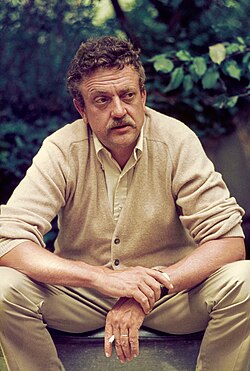Kurt Vonnegut Jr. Quote
The writing style which is most natural for you is bound to echo the speech you heard when a child. English was the novelist Joseph Conrad's third language, and much of that seems piquant in his use of English was no doubt colored by his first language, which was Polish. And lucky indeed is the writer who has grown up in Ireland, for the English spoken there is so amusing and musical. I myself grew up in Indianapolis, where common speech sounds like a band saw cutting galvanized tin, and employs a vocabulary as unornamental as a monkey wrench.In some of the more remote hollows of Appalachia, children still grow up hearing songs and locutions of Elizabethan times. Yes, and many Americans grow up hearing a language other than English, or an English dialect a majority of Americans cannot understand.All these varieties of speech are beautiful, just as the varieties of butterflies are beautiful. No matter what your first language, you should treasure it all your life. If it happens not to be standard English, and if it shows itself when you write standard English, the result is usually delightful, like a very pretty girl with one eye that is green and one that is blue.I myself find that I trust my own writing most, and others seem to trust it most, too, when I sound most like a person from Indianapolis, which is what I am. What alternatives do I have? The one most vehemently recommended by teachers has no doubt been pressed on you, as well: to write like cultivated Englishmen of a century or more ago.
The writing style which is most natural for you is bound to echo the speech you heard when a child. English was the novelist Joseph Conrad's third language, and much of that seems piquant in his use of English was no doubt colored by his first language, which was Polish. And lucky indeed is the writer who has grown up in Ireland, for the English spoken there is so amusing and musical. I myself grew up in Indianapolis, where common speech sounds like a band saw cutting galvanized tin, and employs a vocabulary as unornamental as a monkey wrench.In some of the more remote hollows of Appalachia, children still grow up hearing songs and locutions of Elizabethan times. Yes, and many Americans grow up hearing a language other than English, or an English dialect a majority of Americans cannot understand.All these varieties of speech are beautiful, just as the varieties of butterflies are beautiful. No matter what your first language, you should treasure it all your life. If it happens not to be standard English, and if it shows itself when you write standard English, the result is usually delightful, like a very pretty girl with one eye that is green and one that is blue.I myself find that I trust my own writing most, and others seem to trust it most, too, when I sound most like a person from Indianapolis, which is what I am. What alternatives do I have? The one most vehemently recommended by teachers has no doubt been pressed on you, as well: to write like cultivated Englishmen of a century or more ago.
Related Quotes
About Kurt Vonnegut Jr.
Born and raised in Indianapolis, Vonnegut attended Cornell University, but withdrew in January 1943 and enlisted in the U.S. Army. As part of his training, he studied mechanical engineering at the Carnegie Institute of Technology and the University of Tennessee. He was then deployed to Europe to fight in World War II and was captured by the Germans during the Battle of the Bulge. He was interned in Dresden, where he survived the Allied bombing of the city in a meat locker of the slaughterhouse where he was imprisoned. After the war, he married Jane Marie Cox. He and his wife both attended the University of Chicago while he worked as a night reporter for the City News Bureau.
Vonnegut published his first novel, Player Piano, in 1952. It received positive reviews yet sold poorly. In the nearly 20 years that followed, several well regarded novels were published, including The Sirens of Titan (1959) and Cat's Cradle (1963), both of which were nominated for the Hugo Award for best science fiction or fantasy novel of the year. His short-story collection, Welcome to the Monkey House, was published in 1968.
Vonnegut's breakthrough was his commercially and critically successful sixth novel, Slaughterhouse-Five (1969). Its anti-war sentiment resonated with its readers amid the Vietnam War, and its reviews were generally positive. It rose to the top of The New York Times Best Seller list and made Vonnegut famous. Later in his career, Vonnegut published autobiographical essays and short-story collections such as Fates Worse Than Death (1991) and A Man Without a Country (2005). He has been hailed for his darkly humorous commentary on American society. His son Mark published a compilation of his work, Armageddon in Retrospect, in 2008. In 2017, Seven Stories Press published Complete Stories, a collection of Vonnegut's short fiction.
